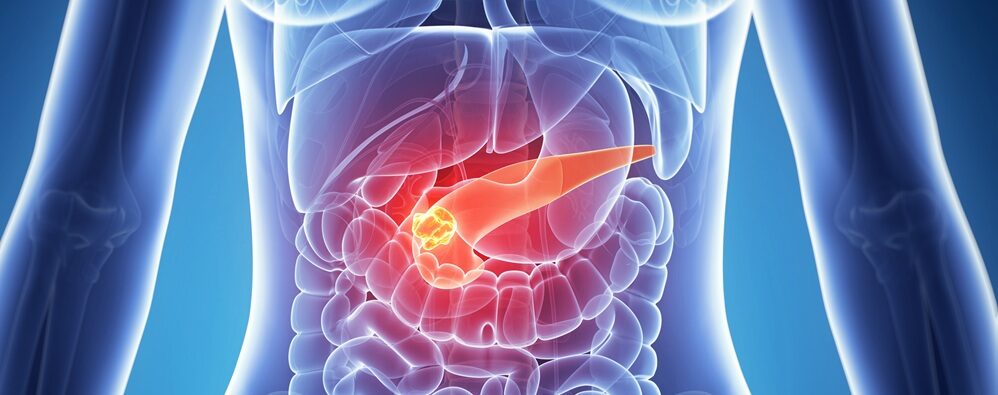In this half-day course, Dr Elaine Vickers – a leading independent educator on the science of new cancer treatments – provides an overview of the targeted therapies and immunotherapies given to some people with oesophageal, stomach, pancreatic or liver cancer, or cancers of the biliary system.
Elaine first looks briefly at the gene mutations and faulty processes and pathways that give rise to upper GI cancers and the factors that increase a person’s risk of these diseases.
She then turns her attention to the targeted treatments and immunotherapies that are relevant to oesophageal, gastroesophageal junction, stomach, biliary, liver, and pancreatic cancer.
Checkpoint inhibitor therapy is now used widely, but it isn’t useful against every form of cancer. Elaine looks at why this is the case and why it is largely ineffective against pancreatic cancer.
Elaine will also describe various treatments that target mutated proteins found in cancer cells, such as HER2, FGFR, and IDH1, and the progress made to date in targeting Claudin 18.2.
Lastly, Elaine will explain why pancreatic cancer is so difficult to treat and describe two promising strategies: personalised vaccines and Ras protein inhibitors.
Audience
This is a wide-ranging course with lots to cover. Rather than providing a detailed description of the diseases, Elaine’s focus is on the treatments: how they work, why they are given to some patients and not others, and what other treatments are being developed.
This course is ideal for research nurses, clinical nurse specialists, pharmacists and clinical trials coordinators. It may also be of interest to other healthcare professionals involved in the diagnosis and treatment of people with upper GI cancers.
ACCEND
NHS England’s ACCEND Programme aims to support the development of a skilled and knowledgeable cancer workforce.
This course supports Component 3 of the ACCEND pathway, the Education Framework.
Specifically, this course’s objectives and learning outcomes meet core cancer knowledge needs at both the ‘Foundation of Cancer Care’ and ‘Fundamentals of Cancer Care’ levels.
The course will enhance learners’ understanding of cancer biology, the mechanism of action of systemic cancer treatments, and the use of biomarkers to select the best treatments for each patient.
The knowledge gained through this course will empower staff to feel confident when communicating with patients and their families, and with clinical and non-clinical colleagues.
Detailed description
Presentation 1 – Introduction to targeted therapies and immunotherapies for upper GI cancers
- An overview of the faulty genes, pathways, and processes that cause cancer
- Introduction to targeted therapy with antibody-based treatments and kinase inhibitors
- The relationship between cancer and the immune system
- Introduction to immunotherapy
Presentation 2 – Treating upper GI cancers with checkpoint inhibitor immunotherapy
- How checkpoint inhibitors work
- Biomarkers of response and resistance
- Combinations
- Timing – advanced vs. early; adjuvant vs. neoadjuvant
Presentation 3 – Targeted therapies for oesophageal, GEJ, stomach and liver cancer
- HER2-targeted therapies for gastric/GEJ cancers
- FGFR-targeted therapies for gastric/GEJ cancers and cholangiocarcinoma
- Targeting IDH1 in cholangiocarcinoma
- Targeting CLDN18.2 with antibody-based treatments for gastric/GEJ cancers
What’s happening with pancreatic cancer?
- A perfect storm – the genetic, molecular and cellular makeup of pancreatic cancer
- Pancreatic cancer – targeted treatment approaches and immunotherapies that have been tried and failed
- How can we make progress against pancreatic cancer?
Pre-course preparation
Elaine has created two YouTube playlists about cancer biology and cancer treatments to help learners get the most out of her courses. Each playlist contains 10 videos between 3 and 8 minutes long.
Elaine advises “If you’re short on time and you’re not sure about the relationship between DNA, genes and proteins, I would suggest watching the Cells, DNA, genes and chromosomes and From genes to proteins videos from the Cancer Basics playlist as a priority. Also, if you’re new to cancer, I’d recommend the Mutations cause cancer video and, in order to understand how cancer cells interact with the cells around them, watch the Tumours are complicated places video.”
“In the Cancer Treatments playlist, there are videos about all the various treatments I’ll be mentioning. The two I’d prioritise explain why we use small chemical compounds (small molecules) and antibodies as cancer treatments. If you have more time, do also watch the videos on kinase inhibitors and immune checkpoint inhibitors.”
About Elaine Vickers

Elaine Vickers of Science Communicated Ltd has a PhD in Molecular Biology. She has worked as a cancer educator for over twenty years.
She is passionate about demystifying the science behind cancer biology and the latest cancer treatments such as kinase inhibitors, monoclonal antibodies, and immunotherapies.
Elaine is experienced in teaching people with any level of scientific or medical knowledge. She particularly loves teaching nurses and other health professionals who might feel daunted by the idea of learning about cancer science.
Her book, A Beginner’s Guide to Targeted Cancer Treatments and Cancer Immunotherapy, is now in its second edition. The first edition was Highly Commended by the British Medical Association book awards.
Elaine also makes short educational videos on cancer biology and treatments, which you can find on her YouTube channel: https://www.youtube.com/@DrElaineVickers
